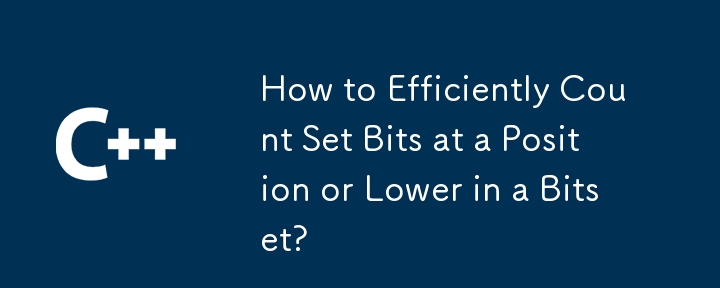Home >Backend Development >C++ >How to Efficiently Count Set Bits at a Position or Lower in a Bitset?
How to Efficiently Count Set Bits at a Position or Lower in a Bitset?
- DDDOriginal
- 2024-12-04 03:10:10786browse

Efficiently Counting Set Bits at a Position or Lower
Problem Statement:
Given a std::bitset<64> with arbitrary bit values and a bit position X (0-63), determine the most efficient way to count bits at position X or lower, or return 0 if the bit at X is not set.
Optimized Solution:
The following C code generates highly optimized x86 ASM that efficiently counts set bits within a specified range:
#include <bitset>
int popcount_subset(std::bitset<64> bits, int pos) {
int high_bits_to_eliminate = 63 - pos;
bits <<= high_bits_to_eliminate & 63; // Shift to place desired bits at the top
return (bits[63] ? ~0ULL : 0) & bits.count(); // Broadcast high bit or return 0, then popcount
}
Implementation Details:
- Shift Operation: The bitset is shifted left by 63 - pos to align the desired bits with the top of a 64-bit register. This eliminates unwanted bits from the count.
- Bit Broadcast: The high bit of the shifted bitset is broadcast to all bit positions using an arithmetic right shift. This creates a mask where all bits are set if the high bit is set (i.e., the bit at pos is set) and all bits are clear otherwise.
- Conditional Popcount: The AND operation combines the bitset with the mask. If the bit at pos is set, the mask will be ~0ULL, resulting in the original popcount. Otherwise, the mask will be 0, resulting in a popcount of 0.
- Optimal ASM: This code produces efficient x86 ASM on 64-bit architectures, leveraging hardware popcount instructions and bit broadcast techniques.
Benefits:
- Efficient for counting set bits within a specified range.
- Works for arbitrary bitset sizes by adjusting constants accordingly.
- Generates highly optimized ASM on many architectures, including x86-64 and ARM64.
- Handles cases where pos exceeds the bitset size without undefined behavior.
The above is the detailed content of How to Efficiently Count Set Bits at a Position or Lower in a Bitset?. For more information, please follow other related articles on the PHP Chinese website!
Statement:
The content of this article is voluntarily contributed by netizens, and the copyright belongs to the original author. This site does not assume corresponding legal responsibility. If you find any content suspected of plagiarism or infringement, please contact admin@php.cn
Previous article:Why Must C Static Member Variables Be Initialized Outside the Class Definition?Next article:Why Must C Static Member Variables Be Initialized Outside the Class Definition?
Related articles
See more- C++ compilation error: A header file is referenced multiple times, how to solve it?
- C++ compilation error: wrong function parameters, how to fix it?
- C++ error: The constructor must be declared in the public area, how to deal with it?
- Process management and thread synchronization in C++
- How to deal with data splitting problems in C++ development

